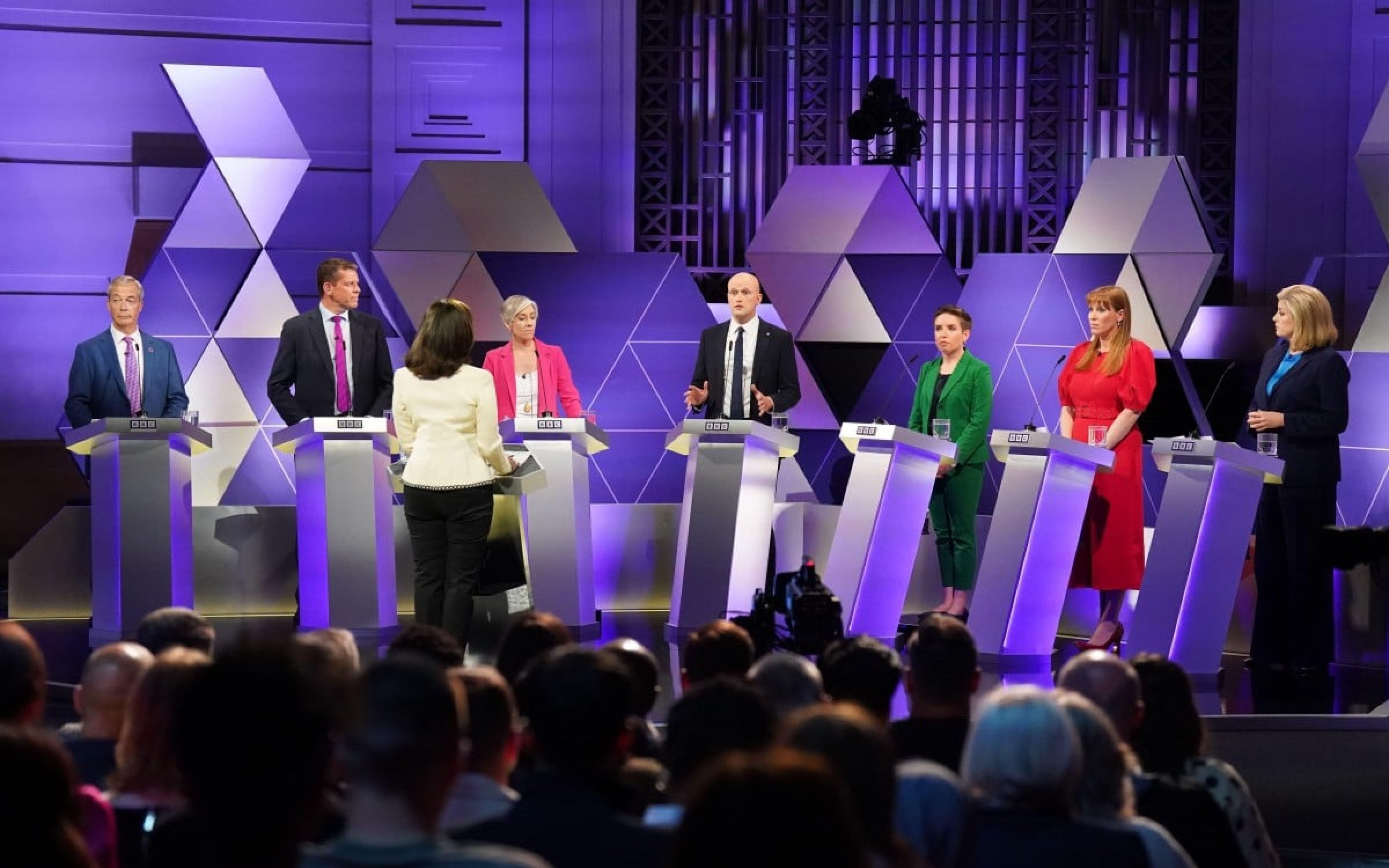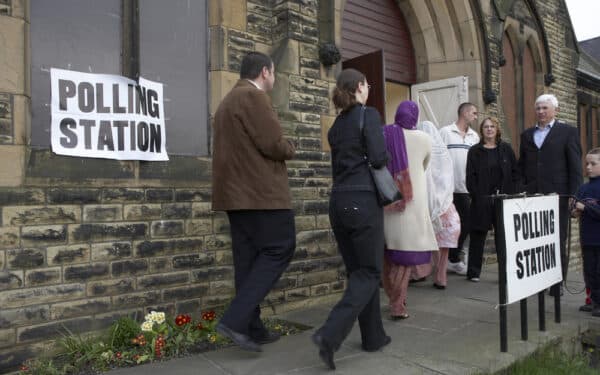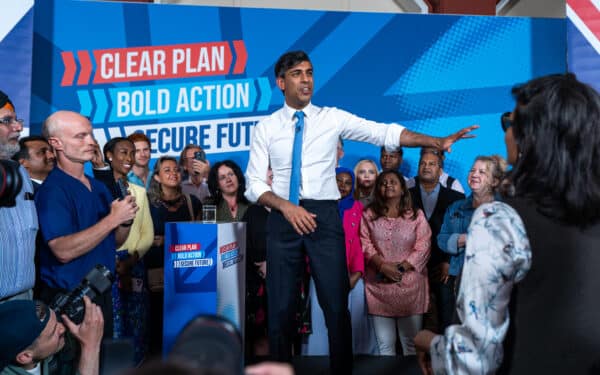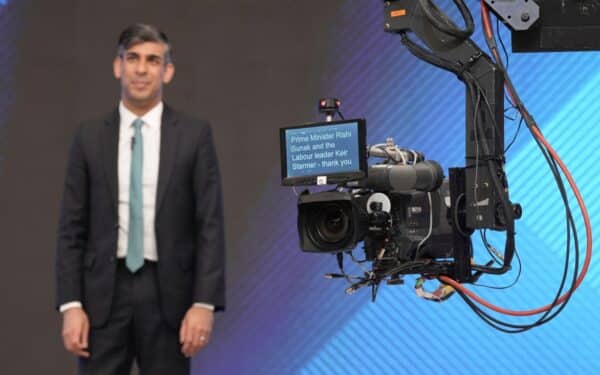The second TV debate of the general election got underway tonight. This time hosted by BBC, it featured leading figures from Britain’s seven biggest political parties. Neither Sunak nor Starmer was present, though they don’t appear to have been much missed. Instead, we had:
Penny Mordaunt from the Conservative Party, Angela Rayner from the Labour Party, Daisy Cooper from the Liberal Democrats, Stephen Flynn from the Scottish National Party, Carla Denyer from the Green Party, Rhun ap Iorwerth from Plaid Cymru and Nigel Farage from Reform UK.
How did they all do? Reaction writers offer their take.
Rayner offered a solid defence – David Waywell, Reaction columnist
The outcome of this deputy debate should have been predictable before it began. This should have been a chance for Penny Mordaunt to remind Tory voters that there’ll be life after Sunak. For Angela Rayner, it was a problematic hurdle she needed to clear against more seasoned players. For Nigel Farage, it was simply a chance to be on the stage and reset himself in front of an increasingly sceptical public.
None of it worked out how we might have expected. Mordaunt looked surprisingly nervous. Her voice caught a few times and she did herself few favours by choosing to spend her night launching increasingly deranged attacks on Rayner. The only surprise was that she didn’t come out swinging her ceremonial sword. The tactic of trying to generate fear around the notion of change did not sound convincing. Repeatedly quoting a discredited claim about a £2000 tax rise might be a strategy but it’s hard to imagine it a winning one. Even when corrected on it, she carried on pedalling it.
Rayner wisely let others fight among themselves. She answered the questions and defended herself when needed but didn’t go out of her way to look for a fight. There were surprisingly effective moments of defence (when she could get a word in). Her accent is problematic – and I say that as a fellow northerner with a problematic northern accent – but she knew her brief, resulting in her sounding authentic, especially around social care. “Fourteen years under the Conservatives” is a powerful message and she struck to her script. Even if she’s not the most polished performer on Labour’s front bench, no damage was done, which Starmer should consider a big win.
Nigel “I don’t need an autocue” Farage stood like a man who’d only met his body in the green room and found it already chaffing around the cuffs. Yet, he’s experienced in these TV debates, and at times acted like a second moderator, interrupting and wisecracking, but all to little effect. His problem was best exposed by the representatives from the smaller parties, who were each at their most effective when going after Farage, who didn’t seem to have much love in the room. Even when Farage was exploiting widespread scepticism about Mordaunt over tax, it was noticeable that the audience didn’t respond, as though their feelings about the man overwhelmed their feeling about the argument. The kind of revolt he was calling for is not, it seems, the kind of revolt much of the British public feels when observing him.
It is unfair not to dwell on the other parties, all represented by effective advocates, but this was really about Rayner’s solid defence and Mordaunt’s ineffective attacks, with Farage providing a carnivalesque sideshow that suggested that his ability to influence an audience is waning. By the end, nothing had changed, except this election feels like the slow unspooling of an already-written fate.
This was a big improvement on the Sunak-Starmer debate – Gerald Warner, Reaction columnist
From the studio layout to the discussion itself, this was a big improvement on the two leaders’ debate, though there was a sideshow re-enactment of that debacle by Penny Mordaunt and Angela Rayner, standing next to each other at the end of the line, where they shouted, snarled and talked over each other even more violently than their respective leaders on Tuesday.
Stephen Flynn, for the SNP, provided the light relief with his claims that everything was brilliant in Scotland, where government pledges have been met. Daisy Cooper, for the Lib Dems, trotted out the claim, popular circa 2010, that net zero policies will create new jobs. She also said, more than once, “Everything feels broken, nothing works.”
The original author of that sentiment, Nigel Farage, who was stationed safely at the opposite end of the row of podiums from the Mordaunt-Rayner war zone, used his time to articulate clear arguments and supporting figures. He hammered Rishi Sunak for disrespecting D-Day; advocated a new model for the NHS based on the French system; and remorselessly cited the immigration statistics of the past 50 years.
Flynn insisted that immigration was beneficial to the economy. Mordaunt urged the audience to vote for “controlled numbers and a cap under us” (the current controlled cap being 1.2 million a year). She also recycled the £2,000 Labour tax claim, which Nigel Farage denounced as “fictitious”.
The entertainment was chiefly provided by the grudge match between Rayner and Mordaunt, who was clearly thinking wistfully of the sword she had carried at the coronation. The end of the programme mercifully came before this violent, but completely uninformative, brawl could degenerate into hair-pulling and handbag fighting. The most authoritative contribution came, as expected, from Nigel Farage, as well as the last word (“I don’t need an autocue”), with the final exhortation: “Join the revolt.”
Green and SNP reps gave the sharpest performances – Adam Boulton, Reaction columnist
The BBC’s seven-header debate restored trust that these things are worthwhile. The public will be better informed about the policies of the parties that are contesting this election in Great Britain.
The format was looser than “Sunak v Starmer” allowing Mishal Husain to conduct a fluid debate. More of interest was said by the seven than the two managed earlier in the week. The pace was more leisurely, with ten to fifteen minutes allotted to each question in a 90-minute debate.
Lots were drawn to ensure fairness and thereby created some of the best drama. Grande dames Penny Mordaunt for the Tories and Labour’s Angela Rayner were stood next to each other, glowering angrily at each other in blue and red respectively.
Mordaunt dealt with her leader’s D-Day snub by calling him “completely wrong”. From then on she was all about the dangers of letting in Labour. Her shouting match with Rayner over the spurious £2000 tax smear on Labour exasperated Mishal Husain, and will be the most played clip from this encounter.
The other participants cheerfully denounced the behaviour of the main party representatives. Greens, Reform, SNP, LibDems and Pride Cymru agreed that the Conservatives and Labour have become like each other. Since they also concurred that the government is “toast”, they aimed most of their fire at Labour.
The sharpest performances were by Stephen Flynn of SNP and Carla Denyer, the Green party co-leader and candidate in one of their best hope seats. Denyer, in a green suit of course, got away unchallenged with spending pledges totalling at least £90 billion a year.
The loudest burst of applause from the well-behaved audience came when Flynn alleged there was a conspiracy of silence over the economic damage done by Brexit. The others, including Nigel Farage, who had just been branded “a snake oil salesman”, chose to carry on conspiring by ignoring his point, except for a couple of random statistics shouted out by Mordaunt.
Farage’s contributions focussed instead on tougher enforcement against crime, pouring scorn on net zero and denouncing immigration. Luck of the draw gave him the last word which he used to boast that he was the one who didn’t need an autocue for his final statement, before urging voters to “join the revolt”.
The five other parties made the best of their televised chance to distinguish themselves from the big two. They may each pick up a few more votes. But the mood was no different from the opinion polls. The revolt is against the Conservatives and Labour will benefit most from any change.
Write to us with your comments to be considered for publication at letters@reaction.life




